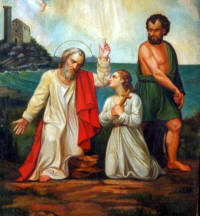Ordinary Time: July 28th
Friday of the Sixteenth Week of Ordinary Time
Other Commemorations: Sts. Nazarius and Celsus, Martyrs (RM); St. Victor I, Pope and Martyr (RM)
» Enjoy our Liturgical Seasons series of e-books!
According to the 1962 Missal of St. John XXIII the Extraordinary Form of the Roman Rite, today is the feast of Sts. Nazarius and Celsus, first century martyrs, whose bodies were found by St. Ambrose in 395. It is also the feast of Sts. Victor I and Innocent I both Popes of the early Church. St. Victor I was pope from 189 to 198; he regulated the date for the celebration of Easter throughout the Church in accordance with the Roman tradition. St. Innocent I (401-417), a contemporary of St. Augustine and St. Jerome, was one of the greatest early popes. He was one of the great champions of the primacy of the Holy See.
Sts. Nazarius and Celsus
Nazarius was baptized by the blessed Pope Linus. He went into Gaul, and there baptized a child named Celsus whom he had instructed in the Christian doctrine. Together they went to Treves, and in Nero's persecution were both thrown into the sea, but were saved by a miracle. They proceeded to Milan, where they spread the faith of Christ; and as they with great constancy confessed Christ to be God, the prefect, Anolinus, condemned them to death. Their bodies were buried outside the Roman gate, and for a long time remained unknown. But through a divine revelation, they were found by St. Ambrose, sprinkled with fresh blood, as if they had but just suffered martyrdom. They were translated to the city and buried in an honorable tomb.
—Excerpted from The Liturgical Year, Abbot Gueranger O.S.B.
Symbols and Representation: Swords; armor and millstones; depicted as a man and boy walking on the sea
Patronage: Carcassone, France; Italy: Arenzano, Bareggio and Bellano
Highlights and Things to Do:
- Read more about Sts. Nazarius and Celsus:
- Watch this Youtube video about Sts. Nazarius and Celsus.
St. Victor I
 St. Victor, who reigned as the Supreme Pontiff from 189 until 199 AD, was born in Africa. In fact, St. Victor is the first Pope to have been of African origin. It was St. Victor who made Latin the official language of the Roman Catholic Church.
St. Victor, who reigned as the Supreme Pontiff from 189 until 199 AD, was born in Africa. In fact, St. Victor is the first Pope to have been of African origin. It was St. Victor who made Latin the official language of the Roman Catholic Church.
St. Victor was a favorite of the mistress of the Emperor Commodus, and his good relationship with her allowed him to present to her lists of imprisoned Christians. Through her power, she was able to secure their releases. Yet, his reign was not without its difficulties. As stated online:
During his reign, he excommunicated several bishops for celebrating Easter on 14 Nisan. Prior to his elevation, a difference in dating the celebration of the Christian Passover/Easter between Rome and the bishops of Asia Minor had been tolerated by both the Roman and Eastern churches. The churches in Asia Minor celebrated it on the 14th of the Jewish month of Nisan, the day before Jewish Passover, regardless of what day of the week it fell on, as the Crucifixion had occurred on the Friday before Passover, justifying this as the custom they had learned from the apostles; for this, the Latins called them Quartodecimans.
Synods were held on the subject in various parts—in Palestine under Theophilus of Caesarea and Narcissus of Jerusalem, in Pontus under Palmas, in Gaul under Irenaeus, in Corinth under its bishop, Bachillus, at Osrhoene in Mesopotamia, and elsewhere—all of which disapproved of this practice and consequently issued by synodical letters declaring that "on the Lord's Day only the mystery of the resurrection of the Lord from the dead was accomplished, and that on that day only we keep the close of the paschal fast" (Eusebius H. E. v. 23). St. Irenaeus of Lyons criticized St. Victor's severity at times.
Accounts also show that Victor excommunicated Theodotus of Byzantium for teaching that Christ was a mere man. Yet, St. Victor remained steadfast and stern as he faced great threats to the True Faith from both Gnosticism and Monarchianism.
In 199, St. Victor I ultimately suffered martyrdom under Septimus Severus. All in all, St. Victor fought for the True Faith and strongly condemned heresies strongly for the uniformity of the Church.
—Excerpted from A Catholic Life
Highlights and Things to Do:
- Read more about Pope St. Victor I:







